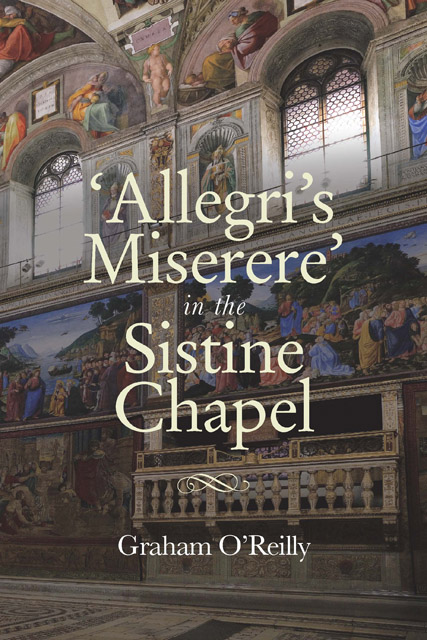Book contents
- Frontmatter
- Contents
- List of illustrations
- List of tables
- List of music examples
- Acknowledgments
- Note on the text
- Introduction: myth and reality
- Part One The Sixteenth and Seventeenth Centuries
- Part Two The Eighteenth Century
- Part Three The Nineteenth Century
- Part Four Performing the Miserere in the Twentieth Century
- Part Five Appendices, Editions and Notes
- List of appendices
- Bibliography
- Index
11 - The Papal Choir in the nineteenth century 2 – Domenico Mustafà
Published online by Cambridge University Press: 13 January 2023
- Frontmatter
- Contents
- List of illustrations
- List of tables
- List of music examples
- Acknowledgments
- Note on the text
- Introduction: myth and reality
- Part One The Sixteenth and Seventeenth Centuries
- Part Two The Eighteenth Century
- Part Three The Nineteenth Century
- Part Four Performing the Miserere in the Twentieth Century
- Part Five Appendices, Editions and Notes
- List of appendices
- Bibliography
- Index
Summary
However great Baini’s achievements as direttore perpetuo of the Papal Choir had been, he did not leave it in a healthy state on his death on 21 March 1844. The problem of recruiting and keeping singers of the necessary quality, which had dogged the choir since 1815, had not been resolved, largely because Papal salaries had not kept pace with inflation. By 1848, for example, no fewer than ten positions were vacant – almost a third of the choir – especially but not only among the higher voices. Had it not been for many singers undertaking a secondo or even a terzo servizio, the situation would have been much worse, but of course this meant that the average age was inexorably rising. The best singers could still carry the group, but they were also in constant demand in other churches and for concerts and salons.
New hope came with a new Pope, Pius IX, in 1846, who wasted little time in expressing his dissatisfaction with the ‘notable deterioration that he found in the Papal Choir’ (‘notabile deterioramente in cui trovasi la Cappella Pontificia’). The following year the singers organised a ‘conference for the improvement of the institution’ (‘congresso per il miglioramento dell’instituzione’), after which they drew up a summary for the Pope, setting out the causes of the present problems and suggesting some solutions. Pointing out that their salaries would have to be doubled to restore the quality of life they had enjoyed in 1590, they nevertheless contented themselves with asking for an augmentation of 30 scudi per month for the partecipanti and 18 for the soprannumerarî. In the face of a tendency to restrict membership to priests, they also asked for confirmation that minor orders were sufficient for membership, as in the past, thereby allowing singers to be married. One respected member of the choir, Mariano Astolfi, composer and director at S. Lorenzo in Damaso and friend of Donizetti, Spontini and Mercadante, went even further, proposing the recruitment of twenty secolari, who would be free not only to marry but also to practise a profession outside the Chapel. While this idea was unsurprisingly rejected, it may have helped to concentrate minds, and in February 1848 the salary increase was granted, although with a sting in the tail: for all future recruits active service was extended from twenty-five to thirty years before a singer became a giubilato.
- Type
- Chapter
- Information
- Allegri's Miserere in the Sistine Chapel , pp. 163 - 168Publisher: Boydell & BrewerPrint publication year: 2020



